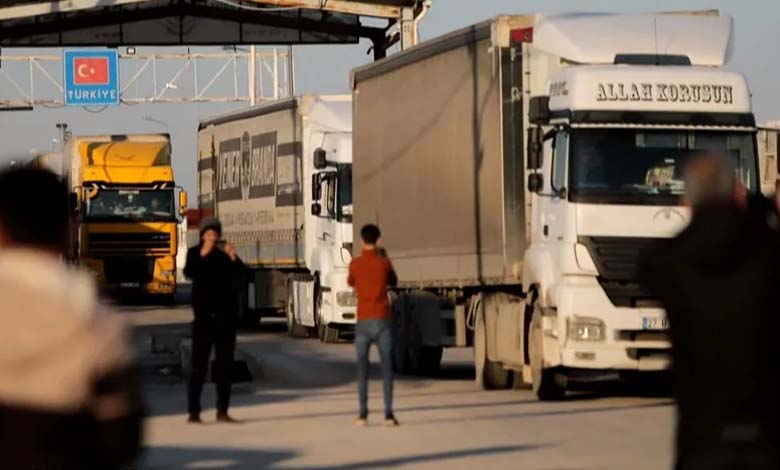The Opening of the Abou al-Zindin Crossing Between Turkey and Syria Depends on Conflicting Interests
Sources indicate an Iranian refusal to open Abou al-Zindin due to its exclusion from the reconciliation process between Ankara and Damascus.

Conflicting interests among the forces controlling northern Aleppo continue to hinder the opening of the Abou al-Zindin crossing in the Aleppo countryside, despite a Russian-Turkish agreement. Areas controlled by Turkey-aligned factions have seen a split between those supporting the opening of the crossing and those opposing it. This has led the civil and military police (opposition) to send reinforcements to the eastern Aleppo countryside, deploying them at the entrances and exits of the city of Al-Bab and closing all roads leading to the crossing.
-
Most of Them from Turkey and Syria… The Federal Ministry of Justice Reveals the Number of “Daesh Children” in Iraq
-
Stumbling Reconciliation Between Turkey and Syria… Where Will the Situation Head?
Some residents of the city organized a march in Al-Bab, east of Aleppo, in support of the opening of the Abou al-Zindin crossing, waving Turkish flags to show support for the Turkish stance. Meanwhile, other residents held an evening demonstration, calling for the fall of the regime and improvements in living and economic conditions, expressing their rejection of normalization with the Syrian government.
In the Future Square in central Azaz, the “Dignity Sit-in” continues, with citizens gathering to express their opposition to the opening of the crossing and steps towards normalization with Damascus under the Russian-Turkish agreement.
-
For 13 consecutive days, UAE continues to send aid to Turkey and Syria
-
International aid must start flowing to Turkey and Syria to save survivors from the rubble – Details
The Abou al-Zindin crossing, closed in 2020, was previously used as a point for exchanging prisoners and detainees between the opposition and the regime, but it never had the status of an official crossing. Currently, there is talk of turning it into a commercial and humanitarian crossing between the two sides.
After its opening last week, the crossing was hit by artillery fire for which no party claimed responsibility, leading to its closure. Protests against the opening continue, accompanied by military reinforcements for the factions.
-
Hundreds Killed and Injured in Deadliest Earthquake in Turkey and Syria
-
Complications of Pending Issues Slow the Normalization of Relations Between Syria and Turkey
The crossing is located in the village of Abou al-Zindin, north of Aleppo, and separates the village from its farms controlled by government forces. It is a commercial crossing situated on the M4 international highway.
It is noteworthy that the interim government, representing the pro-Turkish opposition administration, has not issued any statement regarding the opening of the crossing and has not declared an official position, either in support or opposition. Damascus has also not commented on the news of the crossing’s opening so far.
-
The return of Syria to the Arab fold and the rapprochement with Turkey is disrupting the calculations of the Muslim Brotherhood
-
Two months of hunger and fear – A major humanitarian tragedy in southern Turkey and eastern Syria
Details regarding the mechanism for transporting goods between opposition-controlled areas and government-controlled areas remain unclear. No party has discussed inspection procedures, the nature of the shipments to be transported, or the security risks for drivers of these trucks if they are from the opposition-controlled area.
Sources in the Aleppo countryside have indicated that some factions are demanding a financial contribution in exchange for opening the crossing, which Turkey seems to refuse, thereby inciting protests. Other factions have received promises in return for protecting the crossing and opposing the protests.
-
Syria and Turkey.. Relying on a “friend” on the path of normalizing relations
-
Turkey plans to expand its influence in northern Syria in alliance with terrorism
In Aleppo, security observers have discussed an Iranian refusal to open Abou al-Zindin due to its exclusion from the reconciliation process between Ankara and Damascus, suggesting that Iranian factions may be responsible for targeting the crossing to disrupt it.
Before the opening of the crossing, the Syrian government had removed the barriers on its side of the road, and opposition factions followed the same path, defying resistance calls, which led armed individuals and civilians to attempt to invade the crossing.
-
Turkey: Thousands of Syrians try to escape Erdogan’s hell
-
North Syria town: Clash with Turkey-backed fighters and Kurdish forces
Armed individuals and civilians had also obstructed trucks loaded with goods before the “protest camp” was set up, when these trucks were en route from opposition-controlled areas in the Aleppo countryside to government-controlled territories.
Initially, the opening of the crossing was intended to facilitate the passage of trucks carrying goods between the Syrian regime-controlled areas and other regions. It was anticipated that, at a later stage, the crossing would be opened to civilians, as occurred in 2019.
Five years ago, the crossing also saw the passage of goods and civilians, with several exchanges conducted between the opposition factions and the Syrian regime under the auspices of the countries supporting the Astana process.












